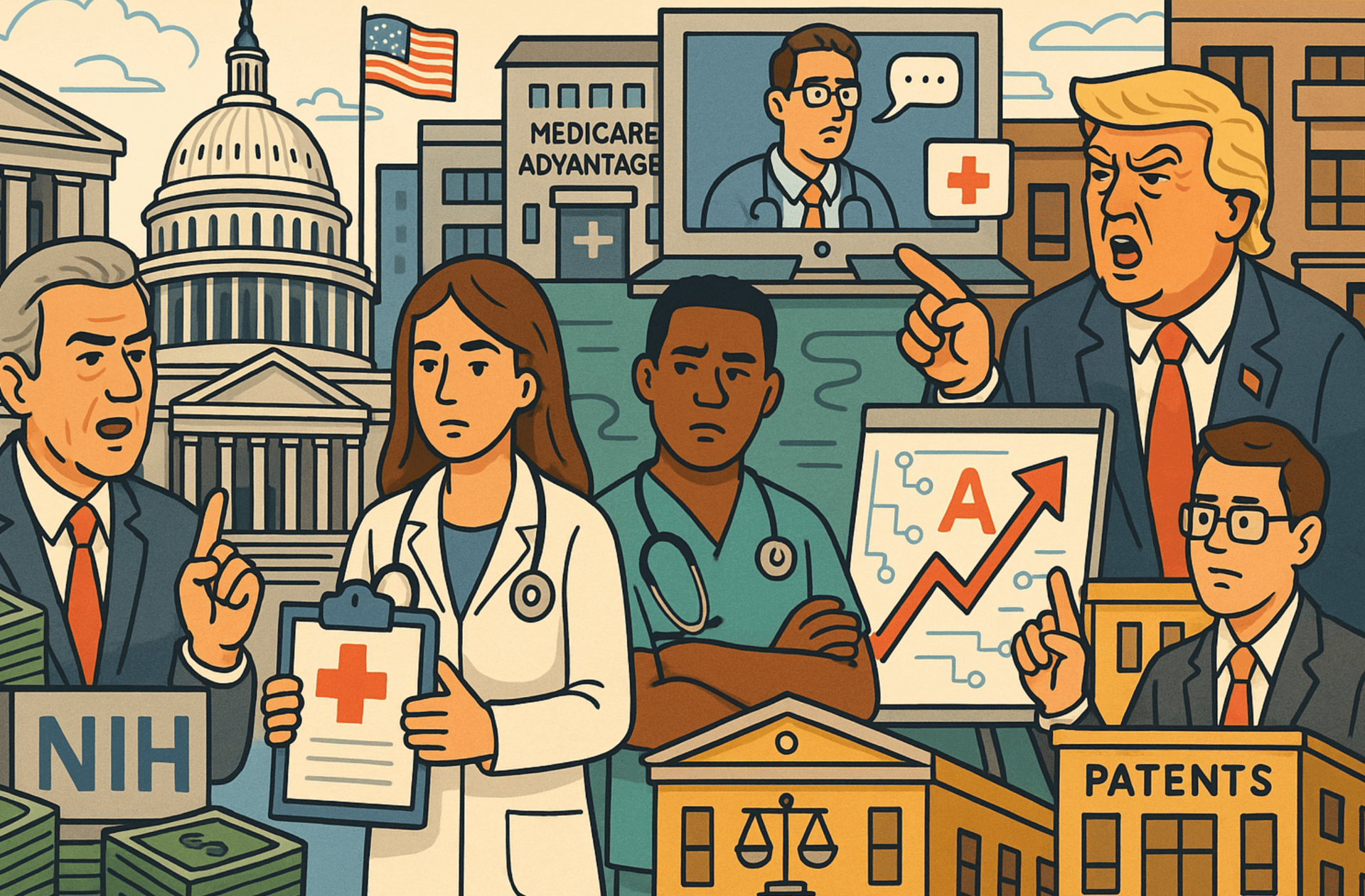- Nimitz Health
- Posts
- Recess on the Horizon, But Health Policy Battles Remain
Recess on the Horizon, But Health Policy Battles Remain
As Congress nears its August break, tensions mount over stalled health spending, delayed rulemaking, and rising regulatory scrutiny in the private sector.

Happy Monday! With the House already out and the Senate rushing toward August Recess, health policy debates are intensifying on Capitol Hill. Here’s what you need to know heading into the week:
In this week’s Nimitz Health:
Federal News: Republicans clash with both White House over NIH funding; scrutiny mounts on Medicare Advantage and UnitedHealth.
State News: Proposed CDC cuts sound alarms in red states; loan caps raise fears of deepening doctor shortages.
Industry News: Aidoc lands $150M for healthcare AI; telehealth waits on DEA rules; HCA raises outlook despite volume dip.
WHO’S HAVING EVENTS THIS WEEK?

Blue Star: Senate Event
Wednesday, July 30th
Senate HELP: “Executive Session to Consider Pending Legislation” at 10am. Watch here.
Thursday, July 31st
Senate HELP: “Making Health Care Affordable: Solutions to Lower Costs and Empower Patients” at 10am. Watch here.
Senate Appropriations: “Markup of the FY26 Labor, HHS, Education, and Related Agencies Appropriations Act” at 9:30am. Watch here.
NEWS DRIVING THE WEEK
Federal News
The NIH is facing fire from both ends of Pennsylvania Avenue—one for moving too slowly and the other for proposing sweeping cuts. Fourteen Republican senators, led by Sen. Katie Britt (R-AL), are urging the White House to release NIH funds that were already appropriated by Congress in March. The GOP signatories emphasized that delays from the Office of Management and Budget (OMB) are “jeopardizing time-sensitive biomedical research” and creating confusion for federally funded labs. While not accusatory toward the NIH itself, the letter reflects broader concern about executive branch inaction on health priorities.
At the same time, Republicans on Capitol Hill are distancing themselves from Donald Trump’s proposed 2026 budget, which calls for an $18 billion cut to NIH. While Trump’s campaign frames the reduction as part of a broader reset of federal spending, Republican legislators are signaling bipartisan support for maintaining NIH funding levels and safeguarding biomedical innovation.
Meanwhile, scrutiny of Medicare Advantage (MA) is growing. A recent congressional hearing revealed that overpayments and restrictive care policies in MA plans have cost taxpayers an estimated $84 billion more than traditional Medicare. Republicans joined Democrats in criticizing practices like upcoding and prior authorization abuse. Reform discussions are underway to tighten risk adjustment and realign incentives.
Finally, UnitedHealth is under dual investigation by the Department of Justice for potential Medicare Advantage fraud and antitrust violations, tied to both billing practices and the consolidation of services under Optum. The probe adds regulatory pressure on a sector already under the microscope in Washington.
State News
State health officials are warning that Trump’s proposed FY2026 budget—which would slash CDC funding by over 50% —could devastate frontline services. The cuts would eliminate federal support for STD prevention, immunization clinics, and disease surveillance systems. Leaders in Mississippi and North Carolina say the loss of pandemic-era funds would force layoffs, lab closures, and disrupt care for vulnerable populations.
States are also tracking fallout from new federal limits on medical school borrowing—$50K per year or $200K total. The cap, meant to control debt, may shrink the physician pipeline, especially in rural states that rely on scholarships and loan forgiveness to recruit doctors. Critics argue it could steer students away from primary care or deter them from practicing in underserved areas altogether.
Industry News
AI investment is accelerating. Aidoc just raised $150 million to expand its CARE foundation model, which supports real-time clinical decisions beyond radiology. Backers include Nvidia and General Catalyst, and the company is also launching an “aiOS” to integrate hospital-based AI tools.
In telehealth, over 200 provider groups are pressing the DEA to finalize long-awaited rules for remote prescribing of controlled substances. With pandemic flexibilities set to expire, advocates warn the current federal plan lacks clarity and may limit access to behavioral health and addiction care.
HCA Healthcare, meanwhile, raised its 2025 guidance despite softening patient volumes. Executives flagged potential risks from ACA subsidy rollbacks and tax policy shifts under Trump but reaffirmed a $5B investment plan focused on growth and tech upgrades.
FOR FUN
Later this week, Emily will be off to Mexico for a girls’ trip. But, if you are stuck in DC during August Recess, there is still plenty to do. Check out the Washingtonian’s guide here!
JOIN THE NIMITZ NETWORK!
Enjoying our updates? Don’t keep it to yourself — forward this email to friends or colleagues who’d love to stay informed. Please subscribe to our other publications by clicking below:
|
|


